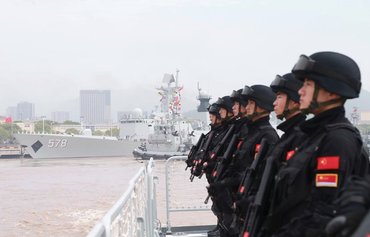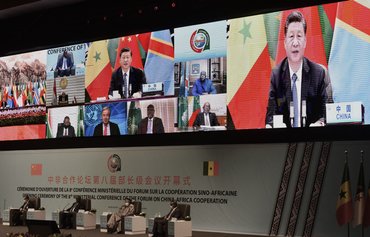NAIROBI, Kenya -- When the Chinese government opened its first oversees military base in Djibouti in August 2017, Beijing called it a "logistics facility", though local residents and international observers had their doubts.
The base fits within Chinese President Xi Jinping's ambitious expansion plan under the Belt and Road Initiative (BRI), also known as One Belt One Road (OBOR).
It is also one link in Beijing's "string of pearls" strategy to link mainland China to the Horn of Africa via a network of military and commercial facilities.
But more than five years later, Djiboutians are still questioning the base's purported purpose as it becomes more and more evident that China is flexing its burgeoning military muscles abroad.
![Members of the China Merchants Group pose for photos at the main gate of the Djibouti International Free Trade Zone after the inauguration ceremony on July 5, 2018. [Yasuyoshi Chiba/AFP]](/cnmi_am/images/2023/04/04/41357-China-Merchants-Group-600_384.jpg)
Members of the China Merchants Group pose for photos at the main gate of the Djibouti International Free Trade Zone after the inauguration ceremony on July 5, 2018. [Yasuyoshi Chiba/AFP]
![Djiboutian President Ismail Omar Guelleh is welcomed by Chinese President Xi Jinping prior to their meeting in Beijing on September 2, 2018. [Andy Wong/Pool/AFP]](/cnmi_am/images/2023/04/04/41358-Djibouti-China-presidents-600_384.jpg)
Djiboutian President Ismail Omar Guelleh is welcomed by Chinese President Xi Jinping prior to their meeting in Beijing on September 2, 2018. [Andy Wong/Pool/AFP]
Djibouti, which is strategically situated at the southern entrance to the Red Sea, already hosts the militaries of the United States, France, Japan and Spain.
The United States and France have a long-established military presence there, said Djibouti native Omar Ibrahim, 48, who works at the Kenyan Port of Mombasa.
They support stability and security in the region and help African governments "fight terrorists such as [Somalia's] al-Shabaab and pirates in the Indian Ocean", he said.
Hidden agendas
Ibrahim voiced his suspicion about China's motives, however, saying he wants Djibouti's leadership to refrain from leasing land for the further establishment of military bases to countries that hide their real intentions.
"The establishment of a Chinese military presence in Africa has more hidden intentions than meets the eye," he said.
Since Djibouti sits on one of the world's busiest maritime routes, China's military presence there has more to do with protecting its commercial and economic interests than "having the interests of Djiboutians at heart", Ibrahim said.
He expressed concerns that the Chinese military base is being used as a staging point for China's commercial exports, thereby depriving the Djiboutian government of customs revenue on imports camouflaged as military hardware.
"We already owe Chinese banks a lot of money," the port worker said.
China is Djibouti's largest lender, holding more than $1.4 billion in debt -- about 42% of annual gross national income, according to the World Bank.
Income from the rental of land for military bases is one of Djibouti's primary sources of revenue, Ibrahim said, noting that "little of this money is trickling down to the common man because it goes back to servicing Chinese loans".
Nairobi shop worker Faiza Ahmed, 40, also from Djibouti, said her country should be cautious about welcoming China with open arms, warning the authorities to consider Beijing's real intentions and the long-term implications to the established world order.
China wants to increase its influence in Africa and beyond through its military base in Djibouti and other economic activities, such as the railway between Addis Ababa and Djibouti city, the capitals of Ethiopia and Djibouti, she said.
The Djibouti International Free Trade Zone (DIFTZ), the first phase of which was inaugurated in July 2018, was the fruit of a $370 million investment financed under murky terms, Ahmed noted.
"Where did the government get these funds?" she said. "By borrowing from Chinese banks on terms and conditions that the general public do not know."
The Djiboutian government has shown it can be influenced by foreign powers to make erratic and costly decisions regarding its priceless assets, Ahmed said.
"Remember in February 2018, the government unilaterally terminated DP World's concession to operate the Doraleh Container Terminal which it later allowed China Merchants Port Holdings to operate and expand," she said.
This, she said, was "a clear example of a government that was influenced to expel [United Arab Emirates-based] DP World, a reputed global leader in cargo logistics, port terminal operations and maritime services".
"It was an illegal seizure of the terminal from DP World, and this case clearly shows Chinese underhand influence," she added.
DP World is engaged in arbitration proceedings before the London Court of International Arbitration.
Sovereignty not for sale
Djibouti has been raking in billions of dollars through the rent of its land for foreign military bases, said Kingori Kimemia, 27, a history and international relations student at Masinde Muliro University of Science and Technology in Kakamega, Kenya.
It should therefore plough these monies back into the economy and reduce the appetite for Chinese non-concessional loans, Kimemia said.
Djibouti makes more than $125 million annually on rents and related revenue from foreign militaries, according to a US Congressional Research Service report.
Djiboutian policymakers must play their cards well so they do not sell their sovereignty to newcomers "who have ulterior motives that destabilise the traditional friendly nations that have established presence and have stood with Djibouti for decades", he said.
The Chinese may offer incentives in terms of major infrastructure projects, he said, "but that's where the trap is … unserviceable national debt obligations that may be tied to Djiboutian assets".
Kimemia said he hopes Djiboutian decision-makers will not fall into "debt trap diplomacy camouflaged as noble national developments by the Chinese".
Nairobi housekeeper Margaret Maingi, 45, said she fears that China's increasing partnership with African countries, combined with its economic entrenchment, may create the undesirable effect of China becoming the new colonial master.
"I am apprehensive about a moment now or in the future where China controls all of Africa's economies and decision-making through handouts and mega-project developments, thus creating puppet governments on the continent," she said.

![China's People's Liberation Army personnel attend the August 1, 2017, opening ceremony of their base in Djibouti. [AFP]](/cnmi_am/images/2023/04/04/41356-China-base-Djibouti-600_384.jpg)






